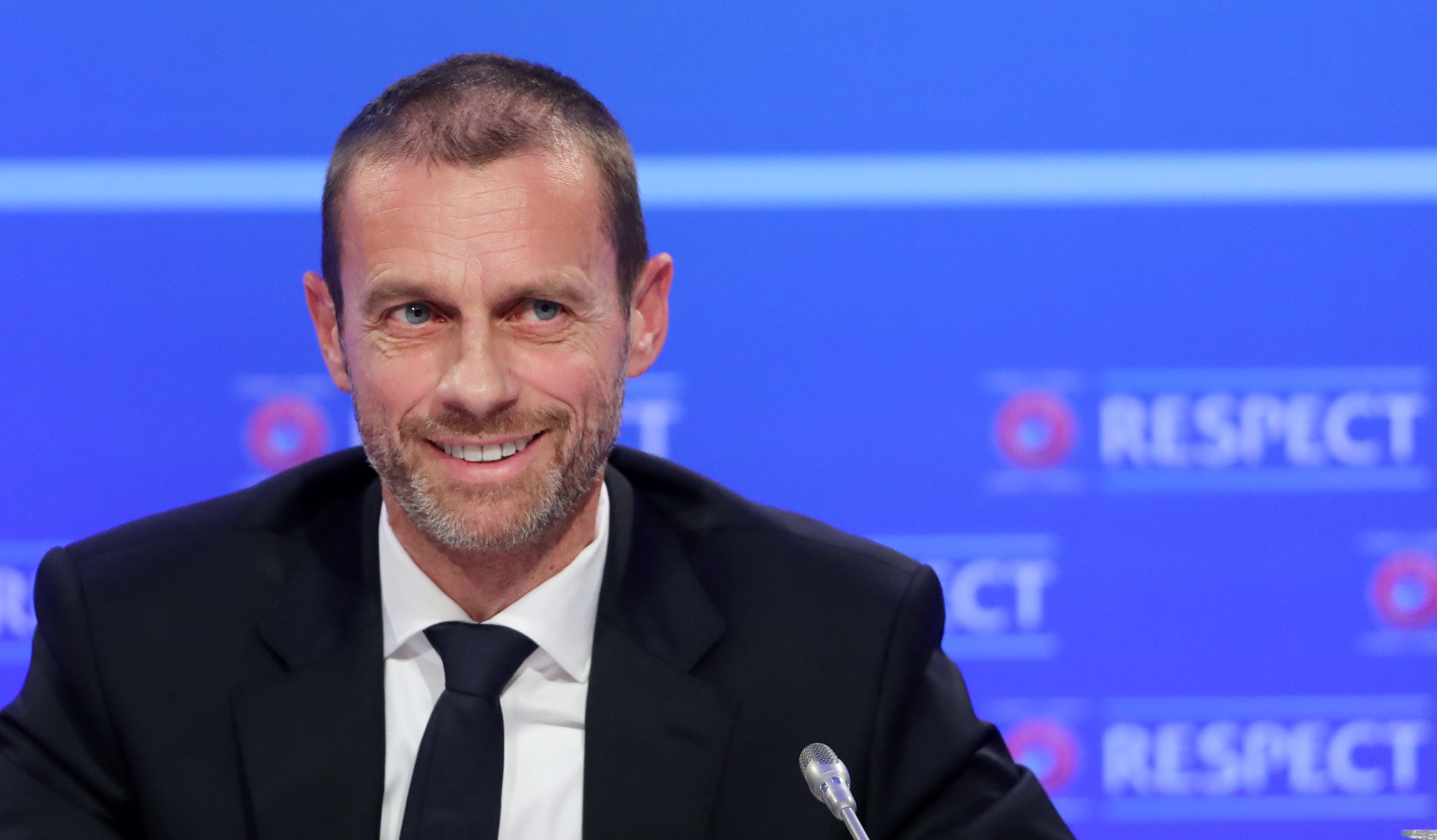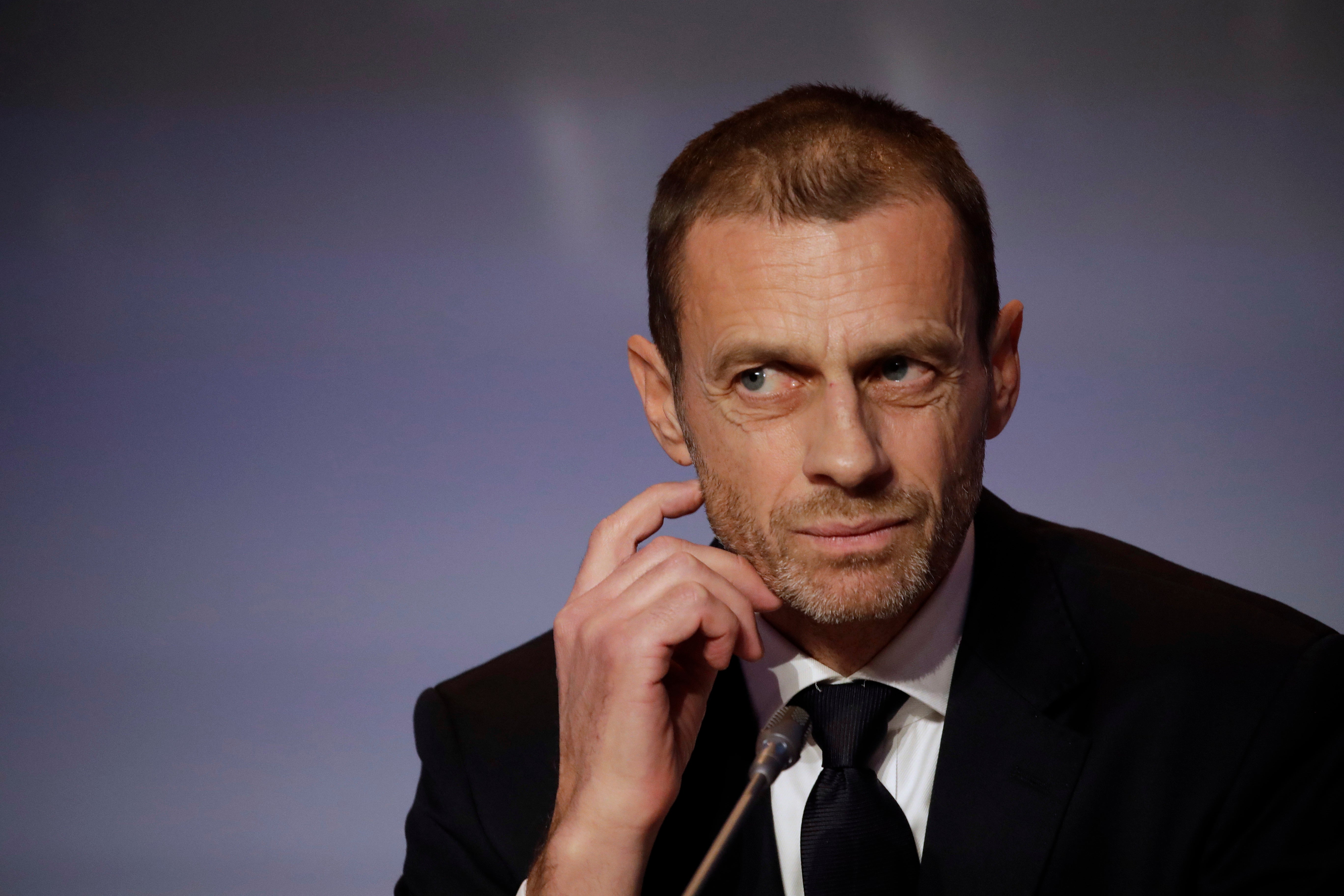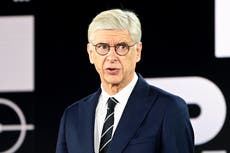You think the European Super League is over? Think again
Many within the game believe we are merely into ‘round two’ of the warring process that delivered the original Super League plan, writes Miguel Delaney


As the Champions League theme plays again, it suddenly inspires a different feeling. It certainly isn’t the same one as late April 2021, when Aleksander Ceferin’s impressive resistance of the Super League inspired a spirit of solidarity around European football. That is gone. Revolution no longer feels in the air.
The protests at Old Trafford have dissipated, replaced by unquestioning adulation for Cristiano Ronaldo. Daniel Levy, one of the key Super League figures, has just been voted onto the executive board of the European Club Association [ECA]. Uefa are continuing at full speed towards contentious new Champions League plans. Most of all, Europe’s governing body is now in open battle with Fifa over a biennial World Cup, an idea that just hadn’t been mooted by any current player or supporter group.
Those at the top of the game feel it is “round two” of the wide-ranging war that brought the Super League plan. So much for football’s new togetherness from the pandemic. So much for Ceferin’s image as the great reformer.
One punch has already been pulled in this fight.
While Uefa initially received more acclaim for announcing that some of the plans for the new Champions League would be re-assessed, a series of sources have told The Independent that Ceferin has no intention of getting rid of the idea of awarding places based on co-efficients. These are effectively a concept from the same thinking as the Super League. They mean some big clubs won't miss out on the Champions League even if they miss out on the qualification places. This idea has already been used when calculating Uefa prize money, essentially awarding these clubs “royalties” for previous European performance.
All of this, added to the so-called “luxury tax”, doesn't exactly point to prising the top level of the game away from the super clubs. They only fortify the structures that widen the gap in football, effectively creating a de facto Super League.
This is exactly why we start a new Champions League season and it seems like even fewer clubs can win it: four from the Premier League, Paris Saint-Germain and maybe Bayern Munich.
“Where is the coherency in thinking?” one source asks. “What happened to the idea after the Super League where it was about ‘earning it on the pitch’?”
If all of this bears out, it will prove only one thing. Ceferin's stance is superficial. His words after the Super League were superficial.
Those who have worked with Ceferin say he doesn’t see it like this at all. “He genuinely thinks he’s some kind of Robin Hood figure," is one phrase.
If so, it’s a curious interpretation of that story. It isn’t so much taking from the rich and giving to the poor, as allowing the rich to take even more while keeping the poor - as well as most of the football population - exactly where they are.

Other stakeholders in the game certainly don’t see Ceferin in that image by now. Some feel a growing sense of frustration at the direction of discussions. A view is that the agendas of Uefa and Fifa don't seem that different.
They are supposed to fundamentally be regulators that safeguard the health of the sport, and take decisions for reasons beyond finance, but so many top-level moves seem primarily motivated by economics. Right now, the two bodies are literally in competition with each other.
It should be noted that Uefa do genuinely do a huge amount of good to keep the bulk of the European game secure, but that also points to the problem. The concessions to the top end prevent mobility and vitality, and are starting to damage the health of the national leagues that remain the lifeblood of the game.
The great irony of all this is that a serious discussion on the football calendar and the distribution of resources is necessary.
The football world would be healthier if more of western Europe’s money was spread around, even within its own continent. It is why the Champions League will never again see a Dynamo Kyiv illuminate the competition.
The calendar itself is a mess. Some of the ideas that govern it, like the spacing of international breaks, are outdated.
Given that the post-2024 calendar still needs to be agreed, there should be considerable scope for this. There would be huge potential for something like a “utopian” calendar if Fifa and Uefa actually abandoned their commercial concerns.
That is unlikely to be the case. The situation is described by many as "upside down". There is a belief that federations must participate more to hold Fifa and Uefa to account and preserve the ecosystem, which is still founded on domestic football.
Even Arsene Wenger’s recent proposals were the wrong way around. They presented a solution before even going through the problem. Wenger raised many issues that do need reform, but a biennial World Cup isn't necessarily the answer.
There are too many competing interests, forcing the situation down certain avenues. They all want control of the calendar, because that represents control of the game and its economics.
So much of this stems from the commercial power of the major clubs and the Champions League. “It all boils down to an industrial battle between Uefa and Fifa over who controls the club game.”
It’s why so many in the club game believe the idea of a biennial World Cup is just a "bait and switch" to force Uefa to accept an expanded Club World Cup instead. The major clubs are naturally open-minded about this. They’d earn a fortune. Playing into this situation is that both Ceferin and Fifa president Gianni Infantino are up for re-election in 2023.
As ever, given the size of the modern game, there are greater geopolitical interests at play too.
A crucial detail is that “so much of the current madness” - to quote one source - started back in 2018 when Infantino thought he had a €25bn loan from Softbank for new competitions, including a Club World Cup. It was felt that the post-2024 calendar offered the potential for this. Softbank is a Japenese company but the money behind their venture fund was all Saudi.
At the same time - during a period that represented the height of the Gulf blockade between Qatar and Saudi Arabia-UAE - feasibility studies were being run to increase the size of the 2022 World Cup to 48 teams. That would have necessitated its spread outside Qatar and into other Gulf states. That never happened, but Saudi Arabian interests remain prepared to fund Infantino’s plans.
The thinking within the game is that would be in return for the staging of World Cup, which would of course offer huge sportswashing opportunities.
The looming prospect of a drastically different calendar has also had other influences. It is like a ripple through a financial market that spooks investors, causing erratic behaviour. Some clubs are getting concerns about changing media consumption habits, as could be seen with Florentino Perez’s pitches about the Super League.
Financiers and private equity firms are meanwhile looking for opportunities to invest, and they now see control of competitions - as with CVC and La Liga - as far more lucrative than control of individual clubs.
All of these forces have driven these ructions, and so many attempted land grabs. And in all of it, very few involved seem to be behaving like regulators. This is what Ceferin is supposed to be, and what he has cast himself as.
It is why a huge opportunity may have been missed in the wake of the Super League, and the sport might be sent down a path that is impossible to turn back from.
It is also why we’re seeing the greatest divides in the game in over a century, when it was still settling into its modern form. It is akin to the factionalism in cricket. Unlike cricket, though, football doesn’t need to create new competitions to boost its popularity. The problem is everyone wanting a piece of that popularity.
One central force runs through all of this. That is the knowledge that everyone needs to keep the super clubs onside. They have renewed influence on the ECA.

Paris Saint-Germain’s Nasser Al-Khelaifi has meanwhile just been voted in as chairman. He is seen as so much smarter than Andrea Agnelli, and likely to run the game. There is a strong feeling he will probably end up running for the presidency of either Uefa or Fifa at some point in the future.
As one source quipped, “Nasser never has to worry about Financial Fair Play again”. The new strength can be seen in how PSG rejected an immense bid from Real Madrid for Kylian Mbappe, who is out of contract next year.
Many see it as reflecting the extent of Qatar’s takeover of the game, to go with Abu Dhabi’s influence at Manchester City, Saudi Arabia’s repeated attempts at influence and then the remaining power of American venture capitalists and a Russian oligarch.
We are really back around where we were at the start, which is heading towards a Super League in a different form. That just might be within Uefa, though.
There will probably be at least another year of all this noise. Many feel there will eventually be a deal between Ceferin and Infantino. They do ultimately have some of the same objectives, which is preserving a certain amount of power for their bodies.
It is just reflective of the modern Champions League that this month’s most important action probably took place last week, in committee rooms, before the group stage even began.
None of the players or managers or fans involved, of course. That spirit is gone.
Join our commenting forum
Join thought-provoking conversations, follow other Independent readers and see their replies
Comments
Bookmark popover
Removed from bookmarks